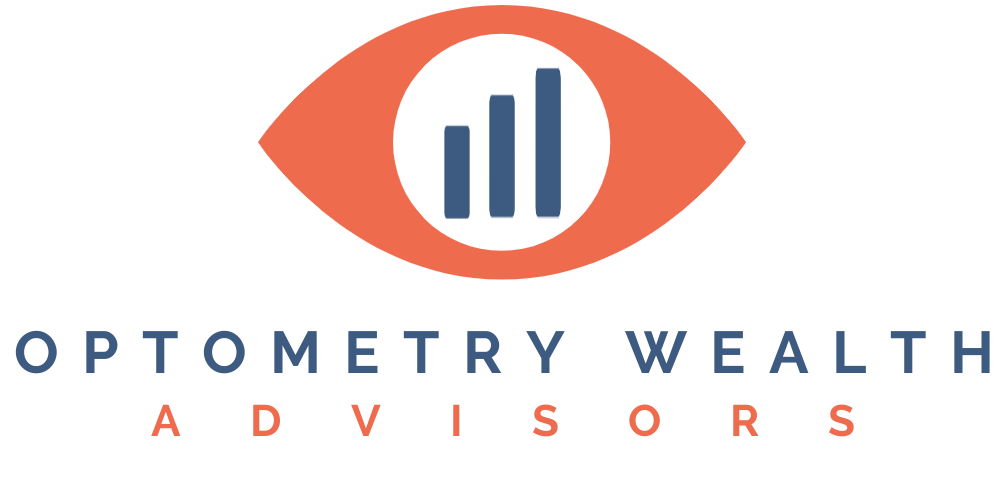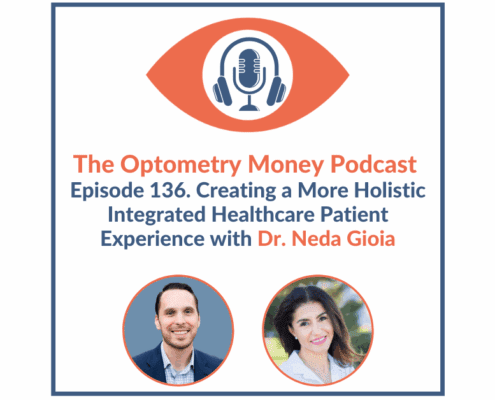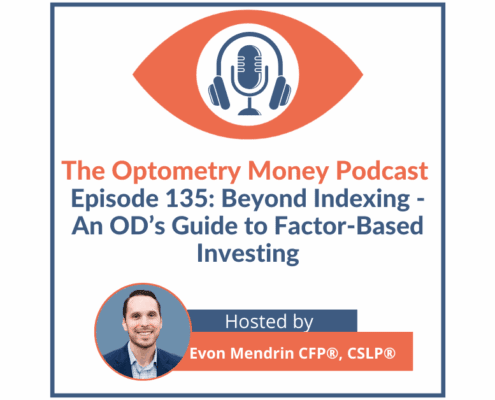The Optometry Money Podcast Ep 131: Fresh Student Loan News and Tradeoffs ODs Choose When Using IDR Plans Toward Forgiveness
Questions? Thoughts? Send a Text to The Optometry Money Podcast!
In this episode, Evon Mendrin, CFP® dives into the latest twists in the federal student loan landscape—and what they mean for optometrists using income-driven repayment (IDR) plans. There’s big news on SAVE plan court rulings, loan consolidations, and IDR recertifications. But more than that, Evon explores the deeper question: What are the tradeoffs you accept when choosing an IDR path toward forgiveness?
Whether you’re a recent graduate figuring out your repayment plan or a practice owner managing loans alongside business goals, this episode breaks down the current student loan climate and the ongoing volatility—and why you should base your decision on math and personal tolerance for policy uncertainty.
What You’ll Learn:
- The most recent updates to federal student loans
- What’s happening with student loan consolidation and past payment history
- Why IDR recertification deadlines have been pushed back—and what to do if yours wasn’t processed
- The current status of IDR applications (they’re back!) and why servicers aren’t processing them (yet)
- The key tradeoffs to consider when planning around forgiveness vs. full repayment
- How student loans compare to other long-term financial decisions in terms of uncertainty and control
Resources & Links:
- Eyes On The Money Weekly Newsletter – Sign up here and get your Guide to 2025’s Most Important Numbers
- Student Loan SAVE Plan Court Case Guidance
- Have a question or want to dive into your student loan strategy? Reach out at podcast@optometrywealth.com
The Optometry Money Podcast is dedicated to helping optometrists make better decisions around their money, careers, and practices. The show is hosted by Evon Mendrin, CFP®, CSLP®, owner of Optometry Wealth Advisors, a financial planning firm just for optometrists nationwide.
Enjoyed this episode? Leave a review and share it with a fellow OD who needs to hear this!
Subscribe to our podcast below!
Episode Transcript
Podcast Ep. 131: Fresh Student Loan Updates and Tradeoffs ODs Choose When Using IDR Plans Toward Forgiveness
[00:00:00] Welcome back to the Optometry Money Podcast we’re helping ODs all over the country make better and better decisions around their money, their careers, and their practices. I am your host, Evon Mendrin, Certified Financial Planner practitioner, and owner of Optometry Wealth Advisors, an independent financial planning firm.
[00:00:22] Just for optometrists nationwide, and thank you. Thank you so much for listening today. Appreciate your time and your attention.
[00:00:30] And there is more news related to income-driven repayment plans and student loans. I had just recently put out a podcast episode about student loan updates, and almost every time I put out some content about student loans, something else changes almost immediately. And so I. There have been some pretty important updates recently.
[00:00:49] Wanted to, touch on that on this episode here. And I also wanted to talk about trade-offs, the trade-offs that we are accepting when we are using income-driven repayment plans towards forgiveness.
[00:01:02] Most Recent Federal Student Loan News ODs Need to Know
[00:01:02] And so first things first, let’s dive into some of the most recent news and updates here. Some of these as recent as yesterday, March 26th. and so yesterday, yesterday, the Department of Education updated its SAVE court case guidance webpage, and I’ll throw a link to that in the show notes with some important updates here. the first one we notice is that, as expected the entire SAVE plan rule.
[00:01:28] The entire rule that allows for the SAVE plan and put on pause. So not just particular parts of the SAVE plan, but the entire rule that created it or allowed for it, which is important. ’cause this was a huge, a huge rule that not only allowed for the change from REPAYE to SAVE and all of the new payment calculations on SAVE but it also changed how consolidations were handled. So in the past, consolidations essentially erased all past payment history towards IDR, and it replaced your loans with new consolidation loans and what the new rule what they were improving here is that consolidations would have led to a weighted average of the payment history for the loans that you’re consolidating, rather than just erasing all of that.
[00:02:15]
[00:02:15] all of that past payment history. So with that put on pause, this is a big question mark in terms of what happens now with consolidations today moving forward. So, be cautious if you’re consolidating. You know, unless you are a recent grad with very little payment history. Just be cautious with those consolidations.
[00:02:33] And the other thing it handles was how family size is calculated for your IDR payment calculation and which potentially may end up in the favor of married borrowers with kids. if it’s going back to the old way that family size was calculated and. And there is also something we knew already.
[00:02:51] There is also no forgiveness approved right now while you are on any income-driven repayment plan except IBR.your payment counts. So if you are making payments on SAVE or I guess you can’t anymore, but if you had made payments on SAVE or if you’re making payments on Pay As You Earn, the payments are still counting.
[00:03:11] But if you reach the 25 or 20 year mark. And you try to get that forgiveness, you wouldn’t be able to get it under Pay As You Earn or under SAVE you’d have to switch onto IBR. And so those are some of the things that are impacted by the entire final rule being put on pause.
[00:03:30] the other thing we saw is that the site now explicitly in the guidance states that the buyback program is still available for PSLF.
[00:03:38] So for any ODs that are working at the VA or. currently Kaiser or even a tribal employer, a government employer, that’s something that is still available for you. the other thing we saw and that we heard about recently was that IDR recertification dates have been pushed back to February, 2020 sixth at the earliest for most, for most borrowers.
[00:04:02] And this was something that was already happening for anyone on the SAVE plan. For anyone on the safe forbearance, your recertification dates were punted out into the next year, and, with all the stuff going on with the IDR applications and recertification requests being taken off of the website.
[00:04:22] From the Department of Education, a lot of people that were, were getting close to their recertification dates. Were trying to figure out what, what do we do? And us as Advisors to those people, were also trying to figure out what’s the best way to, to try to handle that recertification deadline. So basically they punted, right?
[00:04:40] So they, They for, for most borrowers, they’ve punted, they’ve pushed your recertification date on all of the income-driven repayment plans into 2026.
[00:04:51] Specifically, it depends on exactly how that’s handled. Depends on your recertification date. So if you had to recertify your income and family size on or before February 20th.
[00:05:05] And you recertified successfully before February 20th, and the servicer processed it and calculated a new payment. Unfortunately, that’s your payment. There’s, there’s nothing we need to do, or there’s nothing you can do. We can’t go back to what your payment was. If it was successfully handled and done and processed before two 20, then that’s your payment.
[00:05:28] It doesn’t impact you. if you tried to recertify before February 20th, and it was not processed by your servicer, then your recertification date is pushed back into 2026, February at the earliest, February 20th. At the earliest if you were supposed to recertify and didn’t. Your repayment amount is now based on the standard plan.
[00:05:51] You need to submit a recertification request as soon as possible to get your payments lowered and, and based on your income and family size. so that’s something you’ll need to do if you just didn’t recertify at all and were supposed to, so that’s if you were supposed to re-certify on or before 2/20.
[00:06:09] If you weren’t required to re-certify until after February 20th, then your recertification date is pushed back one year. So gives us a little more flexibility there with everything that’s going on. And I, I think that makes sense. I think everyone, including the Department of Education and, and servicers, need some time as well as borrowers to, to figure out how this is all gonna work and what the courts are gonna do.
[00:06:33] So, gives us more breathing room here. But for those of you on SAVE I want you to keep a close eye on this because. I, regardless of when your official recertification date is, if it’s likely or if it’s even possible that the SAVE plan is struck down by these court cases, it’s possible that you’d need to apply for one of the other income-driven repayment plans.
[00:06:59] It’s possible you’d be forced to switch onto another one, which. As of right now, how that works is that if you try to apply or switch to a new income-driven repayment plan, that’s also going to require you to reshow your income and family size again, you’re going to have to recertify again. So for borrowers that are currently going through the SAVE forbearance, and really for any OD on any income-driven repayment plan.
[00:07:26] With about a month away from April 15th, tax filing. The deadline, I’d be careful and, and really thoughtful about how you’re filing your taxes. First of all, you’d wanna be aware of whether you should or shouldn’t be filing taxes separately if you are married.so that’s number one. Number two, it may make sense to file an extension or perhaps specifically a, a married filing separate extension.
[00:07:51] Because if in the event the court’s rule and SAVE goes away and you’re forced to switch onto a new plan. It gives you more time to either reuse 2023’s tax return if it’s much more favorable than 2024’s would’ve been, or just gives you more time to decide how to file your tax returns if you’re married.
[00:08:12] So talk with your own financial Planner, your own tax advisor to, to go through your student loan planning and, and see what makes the most sense for you. But I think in, in some cases that extension. Which remember is an ex is an extension to file your tax return. It’s not an extension to pay a tax that might be due, that still needs to be paid by April, April 15th.
[00:08:36] But in certain cases where I see the borrowers on SAVE I might recommend an extension just to give us more breathing room
[00:08:43] the next exciting bit of news is that IDR applications are back online, which should have happened a long time ago, at least for IBR. IBR was not and never was at risk. Here. It’s allowed by statute, it’s in the law, but, as a result of the recent. Ruling from a court of appeals. The Department of Education just sort of put everything on pause. It didn’t allow us to switch iDR plans didn’t allow us to recertify income.
[00:09:10] So it’s, it’s good to see progress here. This looks like it was a result of the lawsuit brought by the American Federation of Teachers, however. Even though the IDR applications are back online, it doesn’t look like any servicers are actually processing them yet.
[00:09:26] In fact, on their webpage, the Department of Education specifically says, “although IDR applications are now available, loan services are still updating their systems in accordance with the court’s actions. Servicers will begin processing applications in the near future.”
[00:09:42] So.we don’t know when that’s gonna happen. you probably are also still seeing your servicer update your recertification date or, or your anniversary date. So that’s probably something you’ll start to see happening behind the scenes as well. But although they’re available, they are still not yet being processed unfortunately.
[00:10:00] if you look at the application, you’re gonna see that ICR is there, IBR is there and Pay As You Earn is there. SAVE is no longer an option and one thing just to keep in mind is that there are two versions of IBR. If you were a new borrower with no federal loan balances as of seven of 2014. You are eligible for the new income based repayment, the new IBR, which is a near twin of Pay As You Earn if you’re eligible. That’s probably where it’s going to make sense to head.
[00:10:31] That’s one of the top considerations. If you had loans before then if you had federal student loans before, then you would be eligible for the old version of IBR, which has a less favorable payment calculation and a 25 year forgiveness timeline. So, as long as Pay As You Earn’s available, you might prefer Pay As You Earn instead.
[00:10:52] And one last thing to keep in mind is that you would need a partial financial hardship to hop onto the IBR and Pay As You Earn plans, which means that your payment calculation when calculated under IBR or PAYE would be less than the standard 10-year payment plan based on the loan balance as you’re trying to get into these plans. So if you saw a dramatic rise in your income over the last year or so, or for those of you who haven’t recertify your income since COVID and over that time period, saw a pretty big rise of your income, that’s something you want to keep in mind as well.
[00:11:27] So the drama continues, but it’s nice to see the IDR applications back online. It’s nice to see a little bit more breathing room in terms of the recertification dates. I saw that it caused a pretty good amount of borrowers, some stress, so I, I’m glad to see that. And at the end of the day, we’re still waiting to see what the court rules.
[00:11:45] And then we can go from there. So we’re still waiting on that court case as it relates to SAVE once we have more information, we can start to make more, definitive decisions.
[00:11:54] The Tradeoffs Optometrists Choose When Using IDR Toward Forgiveness
[00:11:54] And so with those updates wrapped up, I wanna talk a little bit about trade-offs and specifically the trade-offs that we accept when using income-driven payment plans towards forgiveness.
[00:12:07] As I often say, there are three general approaches to tackling student loans. Number one, you’re either paying it all down to zero. Treating it like any other debt. Number two, you’re using income-driven repayment plans towards either PSLF or 20 or 25 year taxable forgiveness. Or number three, you’re using a mix of the two, and you’re using IDR plans as sort of a temporary stepping stone before switching routes down the road and paying it down more aggressively and the right way forward is a mix of math and personal preferences.
[00:12:40] The math would tell us when we project out the math, the math would tell us what is the most likely, least costly way to handle the loans. Depending on your loan size, your interest rates, and your income and your family size, and how those change over the next 20 or 25 years, the higher the loan balance relative to your income, the more the math shifts towards forgiveness, especially when the loan to income ratio is somewhere around two to one. And this also depends on the opportunities you’re able to take advantage of when it comes to tax filing, when it comes to split income, for example, in a community property state and your filing taxes married filing separately. Another example is being able to take advantage of pre-tax contributions to retirement accounts like 401k plans, things like that to bring down your income for student loan purposes.
[00:13:32] And when comparing the math, you are comparing the total principle of the debt, plus the interest that you’re paying for full payback versus the total amounts of payments you make plus the tax at forgiveness for the IDR route. That’s sort of the math you’re comparing and bringing it, importantly bringing it into today’s dollars. Whenever you’re comparing different repayment plans or different, different sets of cash flows over very different time horizons, like 10 years, 20 years, 25 years.
[00:14:07] You wanna bring those payments into today’s dollars. You might hear that called net present value, but you want to see it on an apples to apples basis. And when it makes sense to go for the IDR route and you choose to go that direction, you’re making a choice of trade-offs, do you take the route that is likely to be the best option mathematically based on the assumptions you’re using?
[00:14:31] Or do you want to limit the volatility? Of student loan policy decisions and government decisions, and just pay off the debt regardless of what the math says. What’s your tolerance for the ups and downs with government policy?because when you’re going, when you’re using income-driven repayment plans toward forgiveness.
[00:14:54] The math going that direction may be more favorable, but you are adding more work to your life. Or if you’re working full-time with an an advisor like me, we are doing more work together and your advisor’s handling a lot of the thinking there, but you’re adding more work to your life. You need to keep an eye on all these different changes in policy.
[00:15:14] You need to recertify your income and family size every year. You need to make sure you’re handling the tax filing decisions appropriately. taking advantage of pre-tax deductions and pre-tax contributions, and you’ve gotta keep an eye on this over 20 or 25 years for long-term taxable forgiveness.
[00:15:34] And over those 20 years, for example, you may see five different presidential administrations with vastly different opinions of how this should work and, and all forms and variations of congresses over the years. And so. Yes, when going towards forgiveness, it may be the most mathematically optimal route based on the assumptions you’re using, but you’re also adding a lot of that volatility and stress and work that you have to decide how you feel about that, or you have to decide whether to get the help you need in order to take, to take advantage of these, which this is no different than any other long-term financial planning decision.
[00:16:15] For example, when we use retirement accounts, we use. And we make a decision to use pre-tax contributions versus Roth contributions. We’re making an assumption, a bet about future tax laws 20, 30, 40, 50 years from now. Or if you’re buying rental real estate and you are factoring in that depreciation expense and the ability to offset your rental income using that depreciation expense, or if you are relying on 1031 exchanges, well, you’re relying on tax law staying a certain way as long as you own these properties. Or for estate planning, for example, estate planning is making decisions about an uncertain future, taking into account tax laws and estate planning laws, and all of those things can change at any given moment as long as you’re alive and so , any long-term financial planning decision.
[00:17:07] Includes uncertainty around government policy and congressional legislative action. Now, the big difference is that student loans are a hotly debated, highly charged political topic. You don’t see a lot of people. Hotly debating whether people should invest in, in an IRA, for example.
[00:17:29] but student loans, you’re gonna see a lot of different opinions, a lot of very heated opinions around how the student loan system should be handled, whether forgiveness should be, should be available at different things like that. So knowing that, knowing that this decision is, is a decision of trade-offs, just like any other financial decision, it’s a decision of trade-offs. Do you go with the math or would you prefer, would you rather. Limit your exposure to political volatility and just pay off the debt. That is a personal preference decision.
[00:18:02] That’s a personal decision and regardless of all this, I still think at certain federal loan to income ratios, it’s going to make sense for families to plan for forgiveness, especially if we can take advantage
[00:18:14] of all these exciting planning opportunities. And I think it makes sense to plan with the information that we have at hand and leave open the opportunity to adjust down the road if needed.
[00:18:24] And so what you need to decide as first you project out what is the most likely mathematically optimal route for you, and what is your own preference? What is your own tolerance for the ups and downs that can come with student loan policy,
[00:18:39] And you have to decide which trade off makes the most sense for you. But don’t make that decision on fear alone. Please start with the math, make an informed, educated decision, and then go from there. So wanted, to talk a little bit about that because we, we’ve seen a lot of opinions, especially with everything going on lately.
[00:18:59] we’ve seen a lot of opinions about this, and, and we’ve seen a lot of volatility around this from going back from COVID where things were swayed very heavily in the favor of borrowers to now, starting to sway the other direction.
[00:19:14] And it’s important to know which, which of these aspects of student loans are really. Are really in the hands of a presidential administration and the Department of of Education versus what is encoded in law. For example, as we’ve been talking about IBR, the income based repayment plan is encoded in law.
[00:19:33] So we have to have a good understanding of that as well. So that we’re not driven by fear. We, we, we can have a good understanding of how to make decisions. And so, hopefully that was helpful for you. I’m sure as soon as this is posted, there will be even more updates, but, if you want to keep an eye on what’s going on with student loans or any other financial planning topic related to personal finances related to tax planning, related to, practice finances, what you’d want to do is sign up for my weekly Eyes On The Money Newsletter. I will post a link to that in the show notes. You can go and sign up there and I write about all of this stuff and more.
[00:20:07] try to keep ODs out there as up to date as possible. So let me know. Of course, if you have any questions, podcast@optometrywealth.Com and we’ll catch you on the next episode. In the meantime, take care.

RECENT POSTS
- The Optometry Money Podcast Ep 138: The Big Beautiful Bill Act – Tax & Student Loan Reforms Optometrists Need to Watch
- The Optometry Money Podcast Ep 136: Creating a More Holistic Integrated Healthcare Patient Experience with Dr. Neda Gioia
- The Optometry Money Podcast Ep 135: Beyond Indexing – An Optometrist’s Guide to Factor-Based Investing
- The Optometry Money Podcast Ep 134: The Case for Index Funds – Why Optometrists Should Embrace Passive Investing
- The Optometry Money Podcast Ep 133: Strategic Tax Planning Levers in the Optometrist’s Tax Return

 Optometry Wealth Advisors LLC
Optometry Wealth Advisors LLC Optometry Wealth Advisors LLC
Optometry Wealth Advisors LLC Optometry Wealth Advisors LLC
Optometry Wealth Advisors LLC
 Optometry Wealth Advisors LLC
Optometry Wealth Advisors LLC Optometry Wealth Advisors LLC
Optometry Wealth Advisors LLC